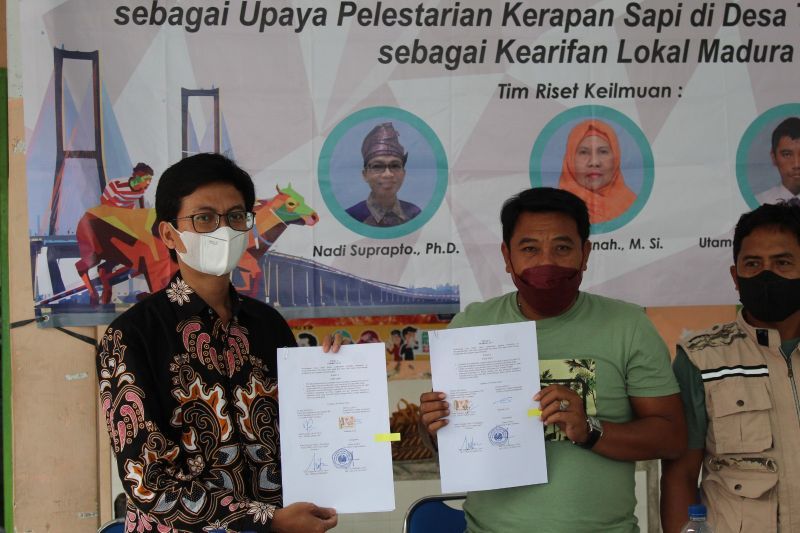
www.unesa.ac.id
Unesa.ac.id, SURABAYA-Indonesia has a variety of traditions that must be preserved and passed down from generation to generation. The preservation efforts must come from various parties, including the campus. That's what three lecturers at the State University of Surabaya (UNESA) did through scientific research in Tengkel Village, Arosbaya, Madura.
Scientific research with the theme “Implementation of the GBR Program: "Glocalization of Bull Racing" was carried out by three UNESA lecturers consisting of Nadi Suprapto, Ph.D as chairman, Dra. Suliyanah, M.Sc., and Utama Alan Deta, M.Pd., M.Si as members. In addition, it involved 15 physics students and village officials and local residents.
Karapan sapi is a tradition of cattle racing originating from Madura, East Java. In this race, a pair of cows competed fast while pulling a series of wooden carts, where the jockey stood and controlled the pair of cows.
"The research we are doing is entitled 'Efforts to Preserve Karapan Sapi in Tengket Arosbaya Village as Madura Local Wisdom'. Last Saturday, we coordinated and socialized with residents and village and sub-district officials at the location. In addition, we also signed the implementation of the collaboration between the UNESA Physics Education Undergraduate Study Program and Tengket Village, Arosbaya, Bangkalan," said Nadi Suprapto on Tuesday (1/2/2022).
The man who is the head of the UNESA Rating Unit added that the scientific research was supported by the LPDP in collaboration with the Ministry of Education and Culture. One of the orientations of this village research is to provide an umbrella for research for undergraduate students who take a thesis program in the context of bull racing as the implementation of the Independent Learning Campus (MBKM) program.
It is hoped that these researches will not only pass on the karapan sapi tradition, but also introduce the Salt Island tradition to all audiences, so that in the future it can become an icon of village cultural tourism there. "How can the traditions of the ancestral heritage continue to be inherited but can also provide economic added value to the village community," he said.
The head of Tengket Village, Rahmat Ja'lik, welcomed the research program, and even expressed his gratitude for making his village a research location. He hopes that the research will run smoothly and can provide benefits for the village community and UNESA.
Naware, one of the local residents explained, the cows used in the competition are not ordinary cows, but cows that are treated with special care. The feed must be of good quality; young bamboo leaves, 15 eggs a day, given herbal medicine, and drinks to the cows that are adjusted according to their respective doses. Every morning the cow is dried and bathed.
As a jockey, usually the children are under 10 years old. In addition, to establish chemistry between the jockey and the cow, it is necessary to practice once a week. As for the tips and tricks to win the race, the cows must be trained and cared for in such a way that they are strong and powerful. "Besides that, the close relationship between the jockey and the cow can also be an indicator of success in the speech competition," explained Naware. [UNESA PR]
Author : Lecturer Team
Editor : @zam
Photo : Doc. personal
Share It On:






